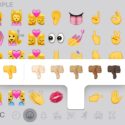Some people love emoticons, and some people hate them. Some use them gratuitously, and some consciously avoid them. I think everyone knows what [emoji smiling face with smiling eyes] means—at least superficially—even if they’ve never seen it before, but what about something like :-#? I find emoticons endlessly fascinating, and I am going to devote a number of posts to them. This is the first.
Alright, so, emoticons. Let’s start at the beginning: Why do they exist in the first place? It seems obvious enough that they were created to inject some emotion and personality into a medium (the written word) that otherwise lacks things like facial expression and emotion. As such, they allow us to clarify our meaning a bit, at least when we’re not writing in formal situations.
At first blush, it may seem that emoticons are meant to replace the missing element of facial expression, and that’s it. After all, that’s exactly what they look like. But that’s not quite the case. Consider some differences:
- Emoticons aren’t persistent with text as facial expressions are with speech. They’re only inserted from time to time.
- Emoticons are always (almost always?) deliberate, but facial expressions may not be.
- Compared to the immense variety and nuance we can communicate via facial expressions, emoticons are rather crude.
So what’s the deal? Upon reflection, it seems that emoticons are very different from our facial expressions, although they share some prima facie resemblances.
So what’s going on here? Walther & d’Addario (2001) drew the conclusion that emoticons are voluntary symbols, rather than spontaneous shows of emotion. This was corroborated by Garrison et al. (2011), who suggested that the placement of emoticons within an utterance may have rhetorical significance. Most recently, Jibral & Abdullah (2013) asserted that emoticons are morpheme-like elements that can be derived and inflected, and that they can be thought of as lexical items rather than non-verbal compensations.
Now that is really interesting. Could it be that emoticons are actually words? Good luck pronouncing [emoji hushed face] .
 Follow
Follow

